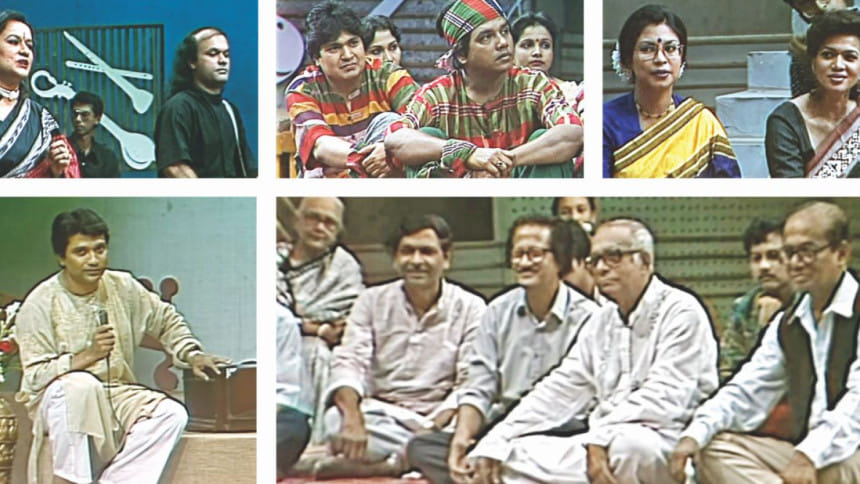A tribute to Annisul Huq's contribution to music

Continued from last week
Rubana Huq was a colleague and sister to my now departed wife Late Nazreen Haque Niboo (1960-2005) who like her was also a teacher at the famed South Breeze School in Dhanmondi. The Huqs lived in around the same neighborhood. I can't remember the exact date, but it was winter of 1993-4 that we visited their house for dinner. This was an exclusive arrangement for us as Annis wanted to “pick my brain” as Rubana said later!
To be honest, Annis turned out to be larger than life. Much adda continued and within the month we were meeting up almost every other day with a sense of urgency. Annis wanted to understand the full gamut of my generation's perception of culture and how it stood against the culture of the puritans. After all, we were from a nation that produced Rabindranath Tagore and Kazi Nazrul Islam.
Before long we found Rubana to be a wonderful moderator in these heated disagreements and soon we were not only making peace but also progress. It was Rubana who came up with the idea of a recorded TV program that not only showcased how well we could perform all known Bengali music genres from Tagore to Nazrul to Sachin Dev Burman to Baul music and Fakir Lalon Shah, our elders also accepted the challenge that they would sing some of our famous songs in the same program, provided we decided to record and perform as their backup band. We agreed outright.
Our horrors came to the fore when we met up face to face with the old folks and Rubana came up to me with a broad smile and whispered “Mac, this is a once for all undertaking. They will ask you hurtful questions, now you better maintain your composure and fight back, in decent Bangla, ok?” I agreed and so did Hamin Ahmed of Miles, Partho Barua of Souls and Nakib Khan of Renaissance.
What followed was Jalsa; an infallible video document of how we went on to change history. It was not through confrontation but through logic, debate and arguments that became part of the public narrative of the time and continues to provide impetus to present day state of culture. What changed or what we changed was the perception of culture and that it was a business like any other business and “making money is no crime” as long as we hung on to some basic scruples and avoid exploitation and corruption. The last time I viewed the Jalsa program clip on YouTube (https://youtu.be/j-WwOoh--U) it had nearly half a million views and on BTV no less than 100 million people have viewed it, making it perhaps the highest viewed musical program in the history of Bangladesh.
Sadly, what we did so forcefully and after the sacrifice of so much time and passion to music was by the late nineties usurped by a group of people who were in essence advertising magnets and serving the purpose of vested quarters. While we may have won a moral victory, the fruit of our struggle was lost and none went on to profit more than our nemesis.
From outright theft of our contents to illegal distribution, musicians have been robbed off and cheated by companies of our lifetime earnings. The majority of us had no other option but take recourse to the law to carry the battle forward. One of the last things Annisul Huq was doing was to help us fight this huge hurdle, in a “proper and positive manner” hinting that if need be, a big delegation of artist and musicians led by him will meet the concerned government authorities and request for the creation of a Cultural Task Force to arrest and punish corrupt individuals.
Unfortunately, fate had to intervene and take away Mayor Annisul Huq from our midst. Given the lessons we have learnt from him we will continue with our struggle, regardless of how long it takes us. Admitted that we will not see the fruit of our labor blossom, we know for a fact that future generation of musicians will be able to make music a full-time profession. Many young bands and performers including my son Dio Haque, drummer for Nemesis and Indalo, are already full-time working musicians who are making enough money to sustain themselves and their music.
Annisul Huq was a meteor that shown bright and burnt itself up even earlier. Perhaps it's due to the pressure of being a visionary in culture, music and later politics that brought the end this fast.
Without Annisul Huq we may have lost a battle but the war continues and we will win the war!
Maqsoodul Haque (Mac) is a columnist and a jazz-rock fusion musician.

 For all latest news, follow The Daily Star's Google News channel.
For all latest news, follow The Daily Star's Google News channel. 



Comments